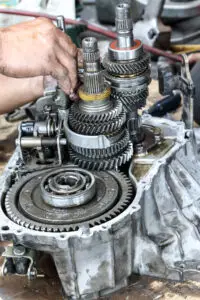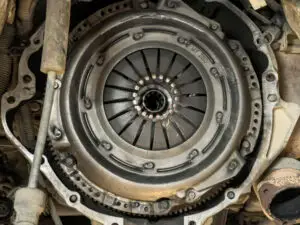Some of the most important knowledge to have about your vehicle are signs of trouble—especially when it comes to the transmission. This system is as complex as it is central to the performance and lifespan of your vehicle. There are clear signs that your transmission needs attention and may be at risk of failure without prompt servicing and repairs. If you notice any of these signs, don’t ignore them—instead, make an appointment with your local AAMCO.
1. Difficulty Shifting Gears
Especially if you drive a manual transmission, you’ll notice right away if it’s difficult to shift gears—you’ll feel it in the shifter when trying to move from one gear to the next. In automatic transmission vehicles, it can be slightly more difficult to catch—often, it shows up as jerking or hesitation during acceleration. In either case, it’s an indication of potentially serious transmission trouble. One of the most common causes of difficulty around shifting gears is the wrong type of or low transmission fluid. If not fixed soon, it could lead to more widespread damage within your transmission.
2. Delayed Gear Engagement
Typically, there’s brief hesitation each time you shift gears, whether you drive an automatic or manual transmission vehicle. On the other hand, delayed engagement means that there’s a longer break between when the shift is initiated and when your vehicle starts moving again. Often, there’s a sudden jerking sensation when the gear finally engages and power is transferred again to the drive wheels. This happens with automatic transmission vehicles and can also lead to slow, sluggish acceleration once a new gear engages. The issue may come down to low fluid, faulty shift solenoids, bad sensors, a damaged torque converter, or other potentially serious transmission problems.
3. Your Car Slips Out of Gear While Driving
Sudden engine revs and poor acceleration are indicators of slipping gears. This means that your car is randomly sliding out of gear, improper engagement, or slipping from one gear into another. No matter where and when you’re driving, this can be dangerous to you and other drivers on the road, since it increases the risk of accidents. While one common cause of slipping gears is low transmission fluid, there may also be damage to gears. In either case, more extensive damage may happen within the system if not fixed as soon as possible—potentially leading to transmission failure.
4. New Sounds or Sensations—Especially Around Gear Shifts
Each gear shift should be smooth and silent. Though not all new sounds associated with the transmission happen during gear shifts, the timing of any new noise or sensation can help point to the underlying cause. A grinding sound or shaking during gear shifts both indicate a potentially serious problem with your transmission. If you drive an automatic transmission vehicle, a humming, whining, or buzzing sound could point to damaged components like gear parts, bearings, or synchronizers. Continuing to drive with any of these issues could potentially lead to system failure.
5. There’s a Burning Smell from Under the Hood

Most often, a burning smell from your vehicle indicates overheating. With the transmission, a burning smell indicates burnt transmission fluid, which could be caused by low fluid level or faulty torque converter. In a manual transmission, it could also point to a worn clutch that needs to be replaced. The clutch or torque converter in your vehicle is responsible for determining how much power is sent out to the drive wheels—if they’re faulty, you may notice serious issues around performance and handling. Any system that overheats is at risk of serious damage the longer you continue to drive.
Keep a Well-Maintained Transmission to Avoid Failure
The best way to head off the above scenarios is to help keep your transmission healthy through routine maintenance services and proper driving habits. Have a professional mechanic inspect your car’s transmission annually and replace the fluid as needed. They’ll have the chance to catch issues before they grow and damage spreads. Your driving habits also impact the health and operation of your transmission. Avoid towing or hauling loads that are too heavy for your vehicle, ease off the gas and brake pedals, and especially take it easy in stop-and-go driving conditions.
Stop a Failing Transmission in its Tracks. Visit Your Local AAMCO.
Whether you’re already dealing with any of these signs of possible transmission failure or you want to head them off with routine maintenance, the expert mechanics at your local AAMCO are here to help. We understand the ins and outs of how your transmission operates, helping us accurately diagnose and easily handle any repairs that may be necessary. You can trust us with your vehicle’s health—and you’ll drive away confident in its condition. Schedule your appointment with us today!
For more tips on maintaining your vehicle, check out our post on Essential Car Maintenance Tips for Chicagoland Drivers.






